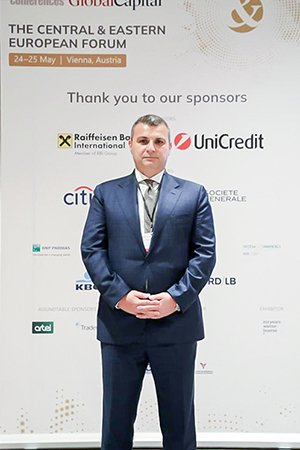BANK OF ALBANIA
PRESS RELEASE
Governor Sejko attends the Central and Eastern European Forum organised by Euromoney
Publication date: 25.05.2022
On 24-25 May 2022, the Governor of the Bank of the Bank of Albania, Mr Gent Sejko, attended the Central and Eastern European Forum (CEE). It is an annual Euromoney event that brings together prominent international personalities in the fields of politics, economy and finance from the CEE countries to discuss the recent economic developments in the European countries and beyond.

Governor Sejko was invited as a discussant in the panel on "Re-thinking the role of central bankers", together with M. Anita Angelovska Bezhoska, Governor of the National Bank of the Republic of Macedonia; Mr Vojtěch Benda, Bank Board member of the Czech National Bank; and Mr Mihály Patai, Deputy Governor of the Magyar Nemzeti Bank, and Mr Boris Vujčić, Governor of the Croatian National Bank.
In this panel, the governors addressed several key issues such as: the response of central banks and their ability to meet the objective of price stability; the response and the extent of the reaction of CEE countries in regard to high inflation; fiscal stimulus and policy coordination among authorities in order to avoid economic recession; increase in public debt to GDP due to the pandemic; and the Russia-Ukraine war, that central banks will also consider carefully in their process of normalizing monetary policy, etc ...

In his remarks Governor Sejko discussed on the latest developments in the Albanian economy and the impacts of crisis in the recent years. Governor stated that price stability has been and should remain the fairest objective of monetary policy. Also, an inflation targeting regime provides the most effective and efficient framework for drafting the monetary policy, while the framework of monetary policy instruments itself needs to be constantly evaluated and updated.
Mr Sejko added that the current global crisis due to the pandemic, the Russia-Ukraine conflict and the sharp upsurge in prices, triggered various challenges to central banks, that need to be addressed and responded to in a timely manner.
He said that the duty of central banks to safeguard the monetary and financial stability of economies becomes more complex, in the presence of continuous, strong and prolonged shocks, as well as the constraints that fiscal policy has as a consequence of the relatively high level of public debt.
In particular, the monetary policy response is conditioned by the complex consequences of supply shocks, but also by the need to be careful not to damage, even indirectly, the process of economic recovery. The monetary policy regime applied by the Bank of Albania, that of flexible inflation targeting, provides the right discretion in decision-making, as long as it takes into account both the final objective of price stability and the need to mitigate the consequences of the shock on the economy. Also, Governor Sejko emphasized that alternative monetary policy regimes, such as targeting prices or exchange rates are not applied in Albania, as the costs they induce in the form of reduced credibility and efficiency are significant.

Further, the Governor said that the main objective of the Bank of Albania is price stability followed by financial stability. As a regulator and supervisor of the banking system and non-banking institutions (which account for about 95% of the financial assets in the market), the Bank of Albania implicitly has the duty to preserve financial stability at all times.
Safeguarding financial stability is complex and requires the active inclusion of other institutional actors. Therefore, there is a need for continuous coordination and cooperation with other institutions involved in this process. In parallel, the Governor highlighted that the sustainability of the country's public finances is the ultimate safety net for financial stability, and therefore it should be a primary concern of fiscal policy.
Consequently, there should be established an effective coordination mechanism between policies and instruments, within and among institutions as well as a clear and transparent communication to fully explain the policy alternatives and choices undertaken by central banks.

 Twitter
Twitter
 Youtube
Youtube
 Facebook
Facebook
 Flickr
Flickr
 RSS
RSS
 Subscribe
Subscribe
 Feedback
Feedback